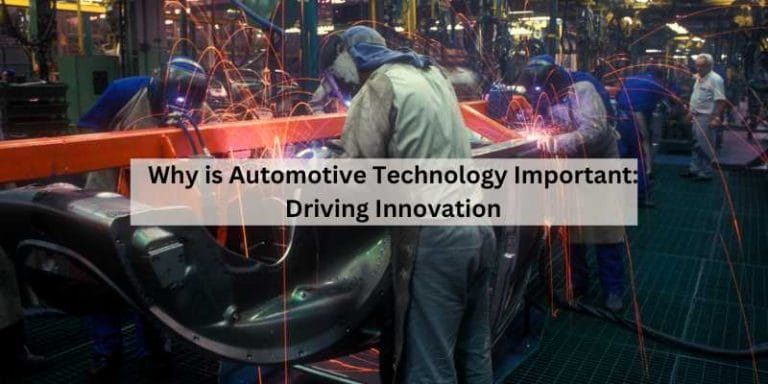Automotive Technology Vs Engineering: Future Trends
Automotive Technology focuses on industry specialization, while Automotive Engineering specializes in design, construction, and manufacturing. Automotive Technology involves hands-on training in the rapidly evolving automotive industry, while Automotive Engineering delves into designing and building automotive components.
Both fields play crucial roles in the automotive sector, with Technology focusing on practical skills and Engineering emphasizing theoretical knowledge and innovation. Automotive Technology programs equip students with practical skills to diagnose and repair vehicles, while Automotive Engineering programs train specialists in advanced design and manufacturing processes.
Understanding the distinctions between Automotive Technology and Automotive Engineering can help individuals choose the career path that aligns with their interests and goals in the dynamic automotive industry.
Introduction To Automotive Sectors
The automotive industry encompasses two key sectors: Automotive Technology and Automotive Engineering. While both sectors are integral to the development and advancement of vehicles, they have distinct focuses and roles within the industry.
Evolving Role Of Vehicles
As technology advances, vehicles are becoming more than just modes of transportation.
- They are evolving into smart, connected devices with advanced safety features.
- The integration of AI and IoT in vehicles is transforming the way we interact with them.
- This evolution highlights the importance of automotive technology in shaping the future of transportation.
Key Differences In Focus
Automotive Technology focuses on the application of technological advancements in vehicles.
- Professionals in this sector work on developing and implementing cutting-edge features in vehicles.
- On the other hand, Automotive Engineering centers around the design and construction of vehicle components.
- Engineers in this field are tasked with ensuring the structural integrity and performance of vehicles.
Divergence In Terminology
Automotive Technology and Automotive Engineering are two related fields but with distinct differences. Automotive Technology focuses on the application of technology to design, manufacture, and operate automobiles, while Automotive Engineering is concerned with the design, development, and testing of automotive systems and components.
While both fields are essential to the automotive industry, they require different skill sets and expertise.
Automotive Technology Defined
Automotive technology focuses on practical applications and hands-on skills required in the automotive industry.
Automotive Engineering Explained
Automotive engineering involves the design, development, and production of vehicles and their components.
Divergence in Terminology:
When discussing automotive technology vs. automotive engineering, it’s important to understand the distinction in terminology.
Educational Pathways
Educational pathways for automotive technology and automotive engineering offer distinct routes for individuals interested in pursuing a career in the automotive industry. While both fields share the common goal of enhancing vehicle performance and safety, the educational requirements and curriculum for technologists and engineers differ significantly. Let’s explore the academic prerequisites and course structures for both paths.
Academic Requirements For Technologists
Prospective automotive technologists typically pursue an associate degree or a vocational certificate in automotive technology. These programs emphasize hands-on training and practical skills development. While specific academic requirements may vary between institutions, applicants are generally expected to have a high school diploma or equivalent. Additionally, some programs may require applicants to demonstrate proficiency in mathematics and science.
Engineering Curriculum Overview
Automotive engineering programs are typically offered at the bachelor’s and master’s degree levels, focusing on a comprehensive understanding of vehicle design, manufacturing processes, and advanced engineering principles. The curriculum includes a mix of theoretical courses, laboratory work, and design projects. Students are required to complete coursework in mathematics, physics, mechanical engineering, and specialized automotive engineering topics. A strong foundation in calculus, physics, and computer-aided design (CAD) is essential for success in this program.
Career Trajectories
When considering a career in the automotive industry, it’s important to understand the different paths that can be pursued within the fields of automotive technology and automotive engineering. Each path offers unique job opportunities and career prospects, catering to individuals with varying interests and skill sets.
Jobs In Automotive Technology
Professionals in automotive technology are equipped with the skills to handle the increasingly complex technological systems in modern vehicles. They are responsible for diagnosing, repairing, and maintaining vehicle electronics, computer systems, and integrated technologies. Some common job titles in this field include:
- Automotive Service Technician
- Diagnostic Technician
- Electrical and Electronics Specialist
- Hybrid and Electric Vehicle Technician
These roles often require individuals to stay updated with the latest automotive technologies and undergo specialized training to work with advanced vehicle systems.
Engineering Career Prospects
Automotive engineering offers a wide range of career paths, focusing on the design, development, and manufacturing of automotive components and systems. Graduates in this field can pursue roles such as:
- Automotive Design Engineer
- Vehicle Dynamics Engineer
- Powertrain Engineer
- Manufacturing Engineer
These professionals are involved in creating and improving vehicle structures, propulsion systems, safety features, and overall vehicle performance. They often work closely with cross-functional teams to innovate and enhance automotive technologies.
Tech Advancements Impact
When it comes to the automotive industry, the impact of technological advancements is undeniable. From the development of electric and autonomous vehicles to the integration of advanced safety and connectivity features, the influence of technology on automotive engineering and technology is profound.
Influence On Automotive Technology
The influence of tech advancements on automotive technology is evident in the rapid evolution of vehicle systems and features. With the integration of AI-driven infotainment systems, advanced driver-assistance systems, and electrification, automotive technology has advanced to enhance safety, efficiency, and overall driving experience.
Engineering Innovations
Engineering innovations in the automotive industry have been driven by technological advancements, leading to the development of lightweight materials, efficient powertrains, and aerodynamic designs. The integration of IoT and connectivity technologies has also revolutionized vehicle diagnostics, maintenance, and performance optimization.
Industry Skills And Expertise

Automotive Technology specializes in the rapidly changing industry, while Automotive Engineering focuses on designing and manufacturing automotive components. The former involves specialization in the field, while the latter trains specialists in assembly and construction.
The automotive industry requires a diverse set of skills and expertise to drive innovation and development. Both automotive technology and automotive engineering play crucial roles in shaping the future of transportation.
Technical Skills For Technologists
Technologists in the automotive technology field possess a range of technical skills. These include proficiency in diagnostics, repair, and maintenance of vehicle systems. Additionally, they excel in integrating advanced technologies such as electric and hybrid powertrains, autonomous driving systems, and connected car technologies.
Engineers’ Design And Analytical Skills
Automotive engineers bring to the table strong design and analytical skills. They are adept at utilizing computer-aided design (CAD) software to develop vehicle components and systems. Moreover, their analytical abilities enable them to optimize vehicle performance, safety, and efficiency through advanced simulations and testing methods.
Future Trends In Automotive Sectors
The automotive industry is rapidly shifting towards electric and autonomous vehicles. Electric vehicles (EVs) are gaining popularity due to their environmentally friendly nature and lower operating costs. On the other hand, autonomous vehicles are revolutionizing transportation by integrating advanced technologies like artificial intelligence and sensors for self-driving capabilities.
In response to the growing concern for environmental sustainability, automotive companies are embracing sustainable engineering practices. This includes the use of eco-friendly materials, energy-efficient manufacturing processes, and implementing recycling programs to reduce waste and carbon footprint.
Bridging Technology And Engineering
When it comes to Automotive Technology Vs Automotive Engineering, bridging the gap between these two disciplines is crucial in driving innovation and advancement in the automotive industry. This intersection combines the practical application of technology with the theoretical principles of engineering, creating a synergy that propels the development of cutting-edge vehicles.
Interdisciplinary Collaborations
Collaborations between technology experts and engineering professionals are essential in creating innovative automotive solutions. By leveraging the expertise of both disciplines, teams can tackle complex challenges and develop holistic solutions that incorporate both technological advancements and engineering principles.
Integrated Approach To Vehicle Design
Adopting an integrated approach to vehicle design involves combining the latest technological innovations with sound engineering practices. This approach ensures that vehicles are not only equipped with state-of-the-art features but are also designed to be safe, efficient, and sustainable.
Concluding Thoughts
Exploring the realm of Automotive Technology versus Automotive Engineering reveals distinct paths within the automotive industry. Automotive Technology delves into specialization in a dynamic sector, while Automotive Engineering focuses on design, construction, and manufacturing of automotive components. Each field offers unique opportunities for those passionate about automotive innovation and development.
The Road Ahead For Professionals
As the automotive industry continues to evolve, professionals in both automotive technology and automotive engineering will face new challenges and opportunities. Keeping pace with the latest advancements in electric and autonomous vehicles, advanced materials, and sustainable manufacturing processes will be crucial for professionals in both fields.
Adapting To Industry Shifts
Professionals in automotive technology and engineering must adapt to industry shifts by acquiring new skills and knowledge. This may involve gaining expertise in software development, data analysis, and artificial intelligence for automotive technology professionals, while automotive engineering professionals may need to focus on advanced materials, aerodynamics, and energy-efficient propulsion systems.
Frequently Asked Questions
What’s The Difference Between Automotive Technology And Automotive Engineering?
Automotive technology is a specialized field that focuses on the practical aspects of working with vehicles. It deals with repairing and maintaining vehicles, as well as installing and testing new systems. On the other hand, automotive engineering is a department that trains specialists in the design, construction, and manufacture of various automotive assemblies and components.
It is more focused on the theoretical and conceptual aspects of vehicle design and development.
Is Automobile Engineering The Same As Automotive?
Automobile engineering focuses on cars, while automotive engineering covers a broader range of vehicle design and construction.
What Is The Difference Between An Automotive Mechanic And An Automotive Technician?
An automotive mechanic handles mechanical parts, while an automotive technician focuses on diagnosing and repairing computerized components.
Is Automotive Technology A Stem Major?
Yes, automotive technology is considered a STEM major due to its technical and scientific nature.
Conclusion
Overall, it is clear that both automotive technology and automotive engineering are critical fields in the automotive industry. While they share some similarities, they differ in their focus and specialization. Automotive technology is more focused on the application of technologies in the industry, while automotive engineering is more focused on the design and development of automotive components and systems.
Both fields offer exciting career opportunities for those interested in the automotive industry. It is essential to carefully consider your interests and career goals before choosing a path to pursue in this dynamic and ever-evolving industry.







